“Life after your PGCE year… My Journey…” (St. Luke’s, Exeter University, UK, June 2017)
On arriving back in to the UK a couple of months ago from my time away teaching and coaching in Chile for the last 4 years, a few weeks ago I contacted my old Secondary Physical Education PGCE Course Leader, Will Katene, to ask if he would like for me to come and present about my journey and experiences to his next cohort of Physical Education teachers graduating this year at their last Seminar Day where they receive the news as to whether they pass or fail their PGCE year and gain Qualified Teacher Status. Will bit my hand off and agreed that I could come down to present to this students.

It’s 15 years to the day that I completed my Secondary Physical Education Post Graduate Certificate in Physical Education at St. Luke’s, University of Exeter, UK. Giving this presentation to the next cohort of Physical Education teachers graduating this year is a very ironic moment in the sense that I find myself in the exact same position as I was back then sat in the lecture room, but this time I’m doing the presenting and not the listening. Life has gone full circle… as I currently seek where my next challenge/opportunity/job will be… just like back then when I was wondering where my first full-time teaching placement would be…?! I was one of those teachers at the time that hadn’t secured a teaching job upon completing the PGCE Physical Education year.
As part of the preparation for this presentation, it has made me reflect on the last 15 years of my teaching and coaching career to date and the people who have been my inspirations and key influencers throughout my life up to this point in time. In another Blog article I will share some of these inspirations, influencers and ‘critical turning points’ with you…
In this Blog article I will share with you some of the messages I shared with the new teachers, some of the things that they will see when they go into their new schools in September and the advice I offered them based on my 15 years experience so far… It will be in 3 parts.
Teaching/Coaching… Coaching/Teaching…
Being able to learn from Wade Gilbert through the GAIN Network have been fantastic new learning opportunities for me. Wade was able to learn from the late great John Wooden first hand and the teachings and messages he is able to pass on to us are priceless gems. One in particular is “when One person teachers Two people learn”. So not only can the pupils learn through different experiences, e.g. when helping/teaching a fellow teammate, you the teacher can learn new things at the same time when you’re coaching your players.
Self-reflection will be a key part of this process and in their careers. Wade’s new book helps to break down the year into 4 parts…. Pre-season, In-season, End of Season and Off-season. He offers numerous practical tips throughout the book. Having received 3 copies, one personally signed by Wade as I contributed a small piece to the book, one from the publishers and then one from a competition on Twitter by Retweeting a Tweet. I thought it would be the perfect prize for a competition…
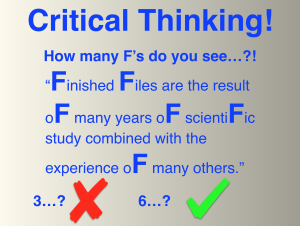
Taking inspiration from when Sir Clive Woodward shared this idea in his book Winning! I use this at various times to make a point… The original paragraph has all the letters in the same size and font and only stays on the screen for 5 seconds. You have to count how many Fs you see on the screen before it disappears. There were 2 people out of 30 who saw 6, so I did the classic teaching decider of Rock, Paper, Scissors to work out the winner in the fairest fun way. So one teacher already has a head-start in her career. If only Wade’s book was published 15 years ago when I was graduating, I’d be an even better teacher and coach than I am now. I highly recommended to them all that they should buy this book. It is a game changer!
John Wooden would say that Teaching is Coaching and Coaching is Teaching. So it doesn’t matter what scenario you find yourself in… what level of athlete you are training… what type of player you are Coaching… what game you are Teaching… “Teaching is Coaching and Coaching is Teaching”.
Here’s a link to John Wooden talking about the Coach-Teacher relationship:
https://www.youtube.com/watch?v=vvX0fkEp0cs
So whether you are in a Physical Education lesson you are Teaching and/or Coaching or in a training session after school you are Coaching and/or Teaching. The words are synonymous.
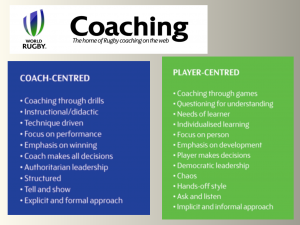
An important point to make at this point in proceedings is that there are different ways to teach… to coach… along a continuum dependent upon many factors… e.g.:
- Situation;
- Age of players;
- Level of pupils;
- Stage of Development;
- Safety.
It just depends… It depends on your experiences as a kid growing up… It depends on the way you were coached by your coaches… It depends what you beliefs have… It depends who your influencers are… It depends what your mentors say and believe in based on the fact that they have already tread the path that you are now treading… It depends what you’ve done to grow as a coach… It depends what has worked or not worked for you in the past… It just depends…
To help with their reflective thinking I shared with them the classic KES video…
Is it about the adults or the kids…?!
You’ve got a Head Coach, an Attack Coach, a Defence Coach, a Forwards Coach, a Backs Coach, the Strength and Conditioning Coach, the Physio and the Team Manager.
Are your lessons about you the teacher or the pupils you are teaching…?!
Are your sessions about you the coach or the players you are coaching…?!
I then shared with them a couple more videos to help them reflect on what GOOD coaching is and what BAD coaching is…
Friday Night Tykes video:
https://www.youtube.com/watch?v=aFXpqZzFgy4&index=76&list=PLo6YyFef1xstOW-WT2qGwFiimx-ke0TLw
https://www.youtube.com/watch?v=wFXLiVG-nIM (in case you don’t get access to the above link)
Hockey Canada Golf video:
https://www.youtube.com/watch?v=ReKw6J5tK2c
Through the very positive and very rewarding experiences I have had using and applying the principles of Pupil-centred Teaching I then reminded them of the definition of Player-centred Coaching…
The key is the Culture that you would like to grow in your lessons… in your coaching sessions…
What are your Standards and Expectations…?!
If you have LOW expectations then you will set LOW standards and thus people will only aim LOW and therefore achieve LOW.
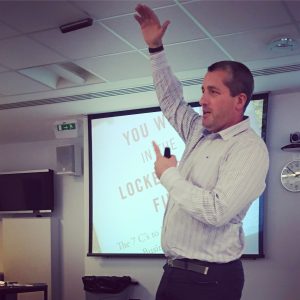
If you have very HIGH expectations then you will set HIGH standards… but players may never meet your HIGH standards and reach your expectations BUT they will sure strive to achieve them and these pupils will achieve far more than if you had LOW expectations and set LOW standards.
What routines are you going to create to maximise learning time…?
What routines are you going to put in place to make your lesson run as smooth as possible…?
Which rituals are you going to grow with your players to develop your relationship with them…?
Which rituals are you going to create with your pupils at the beginning of lessons…?
One of my mentors, Vern Gambetta, talks about the human element…
What are you going to do development this Hu…?
What interactions are you going to initiate with your players to grow this element…?
What opportunities are there throughout the day to nurture this element…?
Quite often as I would walk past someone I would just do some form of non-verbal communication… e.g. a knuckle fist tap with them, a nod, eye contact. The key is some form of acknowledgement. When players arrive at a training session I would ask them about how their day was… or something about an event that they were at that I had seen through Social Media… It could be anything… but the important aspect to acknowledge is that it is something. It might not be a big deal for you as coach/teacher but I’d guarantee it is a MAJOR deal for the pupil/player!
Practice Design…
The next key tip I gave them was to do with Practice Design… Lesson Structure… You need to create a Framework that empowers the players/pupils to use the right tool at the right time… i.e. Decision Making in the context of the real game… the match you are preparing them for on Wednesday afternoon… You need to park your ego in the changing room and allow them to paint their own picture within your frame…
Because once they cross the white line there is nothing you can do… You can do all the shouting in the world but in the heat of the moment where one of your players is about to pass or tackle… they are focused on that task at hand and will not hear you. So why are you shouting…?! Is it for the players’ benefit or more for your own sanity…?! Or is it to please the parents on the sideline because they expect you to be shouting at the players…?! Thinking that it is actually helping the players!
As soon as the game kicks off your best laid plans can thrown out of the window… So how will your robots cope when the computer programme no longer works…?! What will the team do when the Captain is ill off school on matchday…?! How will the team cope when the “best player” goes down injured in the first 10 minutes and can’t carry on…?! Do they have to rely on you now because you haven’t developed their leadership and decision making skills…?!
Kids just want to play games…
How often do you hear the comments: “When can we play a game…?!” How many teachers leave the game to the end because they have behaved well…?!
The over enthusiasm of your kids can easily be overcome… VERY SIMPLY… The 1st thing to do in your lesson is provide an opportunity for your pupils to play a game… do an activity…
How many teachers ask their pupils: “What do you most look forward in a Physical Education lesson/Games lesson/Sports session…?” How many coaches ask their players: “Why do you come to practice after school…?”
You will be amazed at the some of the answers your students will say to you… and knowing these answers will influence how you Practice Design… Lesson Structure… and inform your planning…
The last message I gave the teachers with regards to teaching/coaching was to ensure your Physical Education lessons… Games lessons… Training Sessions… are Fun!, each pupil has loads of touches of the ball, you stretch them by setting challenges just beyond what they are capable of where they make mistakes… and making mistakes is part and parcel of the learning environment and become seen as “normal”. It needs to look something like the game which means players need to learn through games not stood in a line waiting for their turn in mindless Drills! That pupils are constantly making decisions for themselves within the context of the game that they are playing… because that is what they are going to have to do in a game for a Physical Education assessment or a inter-school match on Thursday after school.
Fun can change behaviour…
Check out the Piano Stairs video to see the results of a social experiment in Sweden…
https://www.youtube.com/watch?v=SByymar3bds&list=PLH-T358uPi7fY1nz0B9d4BOMjXsHY6-Nc
So by simply changing the dull, boring and “difficult” steps into something novel… interesting… different… and “challenging”… (aka Practice Design) they were able to engage 66% more people to walk up the stairs. So something that is viewed as more “difficult” than catching the escalator actually engaged more people. What lessons can we draw from this social experiment to our everyday Physical Educations lessons…? …our practices after school…?
I shared with them a story from my recent experience of coaching U8s rugby in Chile. Picture 2 teams, one in their rugby shirts and the other with bibs over the top, within a 40m by 30m rectangle of cones spaced 5m apart around its perimeter. The session would last around an hour and I would let them play different games for 5 minute reps for 3 sets of 2 reps… so 6 games in total. For the first 5 to 7 sessions, 2-a-week, a particular player would just sit on the floor for the whole session. I wouldn’t ignore him completely but as I would walk past him I would make a non-verbal connection or offer a word of encouragement each time. I was growing to grow the Human Element and his intrinsic motivation. (It turns out he was there because mum made him go there so I could “baby sit” on a Friday afternoon).
The results are mind-blowing…! Come a session towards the end of the 2 month mini-season in March and April, the boy was actively engaged in the games that we were playing… he would run with the ball… he would pass the ball to his teammates… he would tackle the opposition… he would run support lines… and I have a great picture of high 5ing the player to congratulate him on an awesome support line because if his teammates had offloaded to him… he would have scored.
There’s then a break in the club season until October… so from May to September I didn’t teach or coach the boy… I only worked on the Human Element if I ever walked past him around school. These moments would always be positive and he’d have a great smile on his face each time!
Come October and November, we enter various Festivals on a Sunday morning and have just the Friday after school training session. During one Festival I “player cam” videoed this player and followed his very action and movement around the pitch. The video will blow your mind away as in the video clip you’ll see the player making try saving tackles… offloading off the floor… presenting the ball to his teammates… tracking a ball carrier ready to get an offload… You’ll see him “in pain” after a tackle… then just lying there for several seconds… then he would just get up and carry on playing with his friends…
FUN can change behaviour for the BETTER… All this was achieved by creating a FUN and enjoyable learning environment for the boys where they were able to play games with their friends… have lots of touches… have lots of goes… make lots of mistakes… answer questions… try new things…
Here’s a link to a “light bulb moment” https://www.youtube.com/watch?v=2_FGZIHkyZo that happened during the same experience and I wrote a Blog article about it here… http://nickhillcoaching.com/?p=826
I then shared my “Better Performance Pyramid” Principle with the new teachers…
In order to create BETTER Teams… you need BETTER Players… in order to develop BETTER Players you need to train BETTER Athletes… in order to create BETTER Athletes you need BETTER People… who will turn up on time… who will arrive with the right equipment… who will do their best… and concentrate… and work hard… who will bring their water bottle… and eat the right types of food… in the right proportions… at the right time of day…
Which one is more important…?


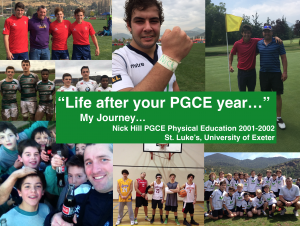
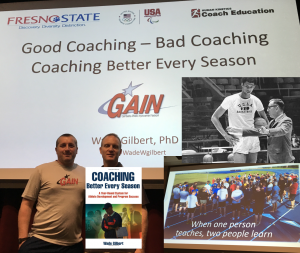

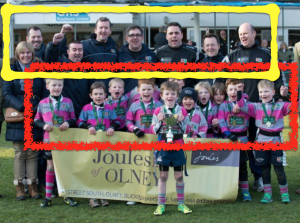
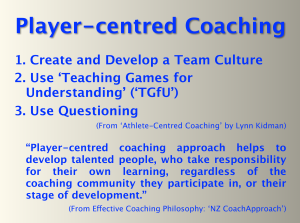
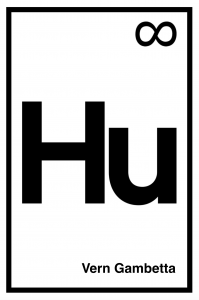


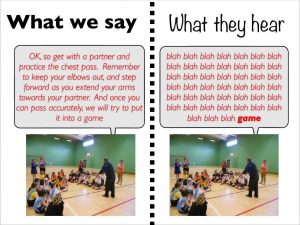
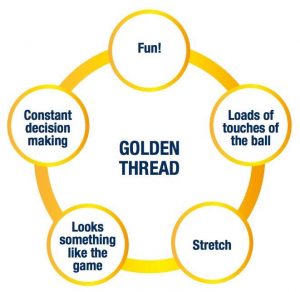

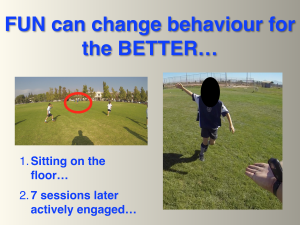
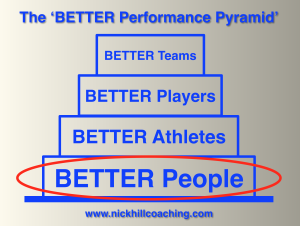
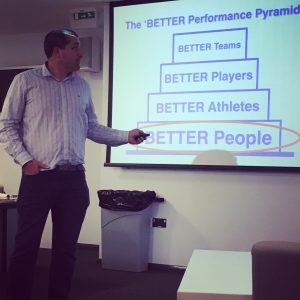
2 thoughts on ““Life after your PGCE year… My Journey…” Part 1”